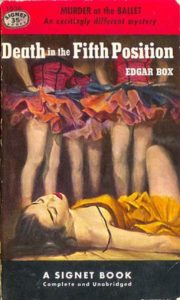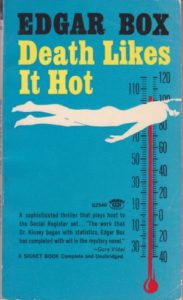“I’m not sufficiently stupid to be a popular author,” Gore Vidal said in reaction to a suggestion that he write paperback mystery novels. Victor Weybright, whom Vidal considered the “wisest man in publishing” during the 1950s, offered his encouragement, “You’ll find a way.” He was also offering the great American author a lifeline.
Homophobia was so virulent and vicious in the mid-twentieth century that the 1948 publication of The City and The Pillar, Vidal’s groundbreaking and brave novel sympathetically depicting the lives of two men in love, threatened to end his literary career. The New York Times Book Review blackballed Vidal from its pages and most major publications followed suit. Eventually, Vidal would move from New York to Hollywood, earn a handsome living as a screenwriter, and triumphantly reemerge as a brilliant and bestselling novelist with his historical epic, Julian in 1964. His “Narratives of Empire” series chronicling American history through one fictional family would solidify his reputation as one of his country’s best and most important writers, and he would also find his name regularly coupled with the title, “America’s best essayist.” (His then comprehensive collection of essays, United States: Essays, 1952 – 1992, won the National Book Award.)
In his immediate moments of exile, however, it was Weybright who allowed Vidal to survive as a man of letters and stories. An admirer of the young novelist’s work, and supporter of gay rights, the publisher of Mickey Spillane and many other successful crime novelists, suggested to Vidal that he write a murder mystery under a nom de plume. Weybright had to summon significant persuasive power, despite Vidal’s desperate need for a steady source of income. The author most acidly objected when Weybright dropped the name, “Spillane.” “I won’t even read his books,” Vidal remembers saying, “I certainly won’t write one.”
Weybright made it clear that Vidal misunderstood. He was not looking for the replication of Spillane, but an alternative—a mystery series of elegance, and a hero who more resembled Vidal than Mike Hammer. Ready to return to writing, the only remaining task was to create a penname. Later, at a cocktail party in a Manhattan condominium, Vidal found himself amused by the surname of an obnoxious, young woman—“Box.” “How is that for a name?” he asked Weybright before settling on “Edgar” for the given name of his alter ego—a tribute to both Edgar Wallace and Edgar Allan Poe.
* * *
Edgar Box’s heroic protagonist, Peter Sargent, is a charismatic and comic amalgamation of its actual author, always showing a sardonic wit and cynical but correct interpretation of human motives, a heterosexual playboy version of Poe’s Auguste Dupin, constantly seeing crime from the angles that elude mere mortals such as police officers and journalists, and, ironic considering that he and Vidal would grow to loathe one another, Dominick Dunne, an enterprising and eloquent social climber.
Sargent is a former theater critic who has become a publicist, moving exclusively among the elite in ornate rooms of wealth and privilege—the theater companies of America’s most renowned dancers, the mansions of US Senators, and the Hampton homes of New York socialites. Raymond Chandler likened the police detective or private investigator, as he or she appears in crime literature, to a modern update of the medieval knight – voluntarily traversing into danger to protect the innocent and serve the interests of justice. Sargent undoubtedly, and delightfully, breaks from the Phillip Marlowe template. In all three of the Sargent novels, the publicist confesses that he cares not for avenging the murdered, or brining the killers to account for their crimes. Instead of upholding the law or a personal code of ethics, Sargent only cares for his own interests. He investigates the murders, independent of police, because he has a sweet deal with a newspaper for exclusive stories of high society. If he can feed them a salacious, insider account of the high crimes and misdemeanors of the rich and famous, he will collect a large check, and in the process, advance his name into evermore ostentatious circles of conversation.
Sargent’s brazen greed and lust for celebrity finds company in nearly every other character in the Edgar Box trilogy, and acts as one of many devices for Vidal to advance his indictment of American society under the auspices of his pseudonym. In the novels of “Edgar Box,” and in their depiction of the ruling class of America, there are no heroes, only villains—killers and conmen and lesser villains, crafty and witty publicists who live only to see their names on invoices and newspapers.
The first novel, Death in the Fifth Position, features Sargent taking a publicity gig for a Broadway theater company preparing to stage a ballet, and struggling to shield itself against McCarthyite red baiting from The United Veterans Committee, which is convinced that communists are on the ballet production staff. Vidal writes the UVC press release as ending with the words, “In a true democracy, there is no place for a difference of opinion on great issues.”
Troubles for the ballet take on much greater severity when its leading star plunges to her death in rehearsal after an unknown murderer used a pair of shears to cut the cable meant to slowly drop her to the stage. She collapses and dies in the perfect “fifth position.” Sargent, of course, found the shears backstage before the death occurred, and picked them up. Not only will he attempt to solve the crime for his treasure with the newspaper, but he will have to clear his name when police find his fingerprints on the murder weapon.
Death in the Fifth Position, like the two Box novels the follow, draws heavily from Agatha Christie, as Vidal would even acknowledge many years after publication. A murder always transpires among a small group of people in a closed location, and much of the subsequent investigation takes place in the same setting. There is only one killer, but nearly everyone on the premise, Sargent will learn, had means and motive, making the task of the hero seemingly impossible.
Vidal channels his politics through Sargent, but never succumbs to the temptation of allowing the story to slip into the background of exposition or pontification. When Sargent does articulate social criticism, it is the natural consequence of a plot turn. For example, when the police begin to harass members of the theater company over their sexuality, Sargent offers the following observation, vastly ahead of its time and applicable to contemporary debate regarding police brutality, profiling, and the myriad corruptions of criminal justice:
There is something about the state putting the power to bully into the hands of a group of subnormal, sadistic apes that makes my blood boil. Of course, the good citizens would say that it takes an ape to keep the other apes in line but then again it is piteous indeed to listen to the yowls of those same good citizens when they come afoul the law and are beaten up in prisons and generally manhandled for suspected or for real crimes: at such moments they probably wish they had done something about the guardians of law and order when they were free.
Sargent ends his condemnation of the police state with a reassertion of his own narcissistic nihilism, “Well, it was no problem of mine at the moment.”
***
Vidal, of course, was adopting the moniker and mission of the crime novelist, because of his own problems with homophobic exclusion. The contextual knowledge of Vidal’s career provides an additional pleasure to reading the first Box novel, as it has Sargent declining an aggressive sexual advance from a handsome, male stage director, but continually curious about how, despite a life of heterosexuality, he wasn’t all that disgusted by the thought of homoeroticism. Vidal’s perspective on sexuality was complex and defiant of category. He subscribed to Alfred Kinsey’s theory that nearly all human beings are bisexual with a slight preference in one direction or the other. Naturally, Sargent refers to Kinsey when he wonders about the “confusing” realization that, for him, “there may be, who knows, not much difference between nailing a boy to the bed and treating a girl in like manner.”
Following Sargent’s own private admission, Vidal appears to amuse himself with satirical presentation of the gender stereotypes that defined crime fiction and film noir of the 1940s and ‘50s. When a damsel in distress falls into Sargent’s arms, and he offers her consolation as she sobs, he describes it as a “gloriously masculine moment.”
Sargent remarks on more than one occasion that it is difficult to “get worked up over private murder when public murder is all the rage,” referring to a United States government that was just entering its seemingly never-ending incarnation as the world’s most committed and militaristic aggressor. Despite his own dispassion, Sargent is able to solve the crime, avenge the fallen ballerina, and emerge the wise hero. The plot turns are as delightful as they are surprising, involving everything form illicit sexuality and media coverups to the Red Scare ideology of the “last Neanderthal man on Manhattan island.”
The second novel, Death Before Bedtime about the murder of a right wing Senator days before he announces his run for the presidency is the weakest of the three. Vidal’s presentation of events to advance a realpolitik analysis of American democracy, rather than an idealistic narration of competing principles, in which Senators are actually unofficial employees of defense contractors is sophisticated, but too serious in tone. It was Weybright, according to Vidal, who encouraged him to write a political crime novel, repeating the old literary cliché, “Write what you know.”
Vidal’s lack of interest and experience with the crime genre served him well in the first novel, because it seems that he is entertaining himself, as he entertains his audience. Death Before Bedtime is an inconsistent combination of Vidal’s temporary diversion with his loftier artistic ambitions. As a result, the novel suffers from an identity crisis, not fully becoming a great political novel, like Vidal’s Burr or Lincoln, nor functioning as an effective mystery, like the Agatha Christie books that informed Edgar Box.
The third and final installment, Death Likes It Hot, has Vidal as his most enjoyably absurd, beginning the story with suspicions that an elephant trampling at a circus is not the accident that it otherwise appears. Sargent is looking into the matter on behalf of the circus company when he agrees to represent a New York socialite who lives in the Hamptons. What follows is an episode of “The Real Housewives of New York,” if the Bravo reality series had a functional brain behind its drama.
Sargent’s sardonic voice provides instruction in the prejudices and vices of high society, as he investigates the multiple crimes that take place in socialite mansions, once again acting in the interest of himself, enhancing the profile of his publicity agency and serving all of the dirty details to the high paying newspaper.
Vidal, who famously moved among high society himself, uses Sargent as his spokesman, making it clear that, although he is among them, he is not of them:
Their favorite word, however, their highest praise is “nice.” You hear the word every few minutes in their company. So-and-so is nice while somebody else isn’t. They have divided the world neatly between the nice and the not-nice and they’re pretty happy with their side of the border. Part of being nice means you belong to the Club and deplore the presence in the community of such un-nice elements as Jews, artists, fairies and celebrities, four groups which, given half a chance, will, they feel, sweep all that’s nice right out to sea.
No one could ever accuse Vidal, at least in his essays, novels, and television appearances, of being “nice.” It was his obstinate refusal to play nice, along with his massive intellect and gift for masterful prose, that made him an American treasure, not only producing a mountain of great literature, but also, unlike Sargent, fighting battles of principle against bigots, homophobes, and warmongers for six decades.
It is surprising that he could excel, at a moment’s notice, in the mystery genre, and reading the Edgar Box novels, one wishes that he had had occasionally returned to the form throughout his storied career.
Seven years after Vidal’s death, American culture has become even more fame obsessed, with millions of its citizens resorting to increasingly embarrassing measures on reality television and social media to acquire celebrity, and its politics have descended into a sewer of hatred, petty cruelty, and anti-intellectual shrieking. It seems that now more than ever, the world needs Gore Vidal, and even Peter Sargent.























